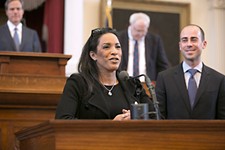If It's Broke, Don't Fix It
Texas school finance system ruled constitutional
By Richard Whittaker, Fri., May 20, 2016

The Texas public school finance system is broken, but not so badly broken that the state is legally required to fix it. That was the head-scratching ruling handed down on May 13 by the Texas Supreme Court, shutting down a five-year challenge to how Texas pays for its public education.
The court's opinion, authored by Justice Don Willett and handed down (with seemingly no irony) on Friday the 13th, found that the system hit the bare minimum required by the Texas Constitution, and so the court could not order the Legislature to improve it. However, while the court did not instruct lawmakers to act in the 2017 session, Willett called the current system flawed and "increasingly Daedalean," adding that students "deserve transformational, top-to-bottom reforms that amount to more than Band-Aid on top of Band-Aid. They deserve a revamped, nonsclerotic system fit for the 21st century."
The lawsuit began in 2011, when the Texas Legislature (working off incorrect revenue forecasts from then-Comptroller Susan Combs) gouged a $5.4 billion hole in the amount it sends to school districts. That triggered legal challenges from 600 school districts, as well as the Equity Center and the Mexican American Legal Defense and Educational Fund (MALDEF), and in 2014 Judge John Dietz found for the plaintiffs. He ruled that the current system violated the requirements placed on the state by the Texas Constitution: Not only was the Legislature providing too little money, but the way it was split between districts was critically iniquitous. Moreover, because it required districts to raise property taxes to maintain their schools, it was a de facto and unconstitutional statewide property tax – a finding the state appealed.
The Supreme Court ruling was unexpected. With Dietz issuing such a rounded and point-by-point denunciation of the current system, the general expectation was that the court would have to at least partially uphold his findings. Among lawmakers, speculation was that the worst possible outcome for districts would be that Dietz's ruling would be referred back to a lower three-judge panel. However, Willett not only upheld the constitutionality of the system, but argued that school finance is a policy, not a legal, matter. He wrote, "Our judicial responsibility is not to second-guess or micromanage Texas education policy."
Gov. Greg Abbott (who, while still attorney general, unsuccessfully attempted to remove Dietz from the case) unsurprisingly greeted the ruling with glee. Ignoring any of Willett's criticisms, he wrote, "Today's ruling is a victory for Texas taxpayers and the Texas Constitution."
Conversely, Texas School Coalition attorney Mark Trachtenberg said the decision "represents a dark day for Texas schoolchildren." The Texas Classroom Teachers Association called it "disappointing," while Texas AFT President Louis Malfaro accused the court of "walking away from its responsibility to confront our broken school finance system." At least Center for Public Policy Priorities Executive Director Ann Beeson tried to find the upside, saying that "the Texas Supreme Court has once again declared that not every child in Texas has an equal opportunity to learn."
The Supremes' ruling is particularly troubling for Travis County school districts, including Austin and Eanes ISD, which send a significant proportion of their tax revenue to the state under the "Robin Hood" recapture system. Their hope was that, even if the state didn't add more money, at least the Supremes would instruct the Lege not to bleed so-called "property rich" districts dry. Saying she was "disappointed" in the ruling, AISD Chief Financial Officer Nicole Conley added that the district "educates an increasingly diverse population of 84,000 students, and the fact that we have to do so with outdated financial formulas is discouraging."
Her concerns were echoed by the Greater Austin Chamber of Commerce. While that body is often at odds with district policies, the impact of rising property taxes in its members, combined with the impact on the education of future employees, puts it lock-step with AISD. Appealing to the Lege's anti-tax tendencies, Chamber Senior Vice President of Education and Talent Development Drew Scheberle called on them to provide some tax relief for the $1 billion flowing out of Travis County in the next two years, without damaging education. He wrote, "Even though the Texas Supreme Court ruled otherwise, the Austin Chamber encourages the Legislature in 2017 to provide resources sufficient to ensure the overwhelming percentage of our young people graduate college/career ready."
AISD Board President Kendall Pace argued that, even though the state won the case, the sheer scale of the lawsuit should give lawmakers pause for thought. "Let's put it in terms the Legislature can understand: If two-thirds of your clients think your product or services are broken, then you need to do something about it."
That's what this is all really about. The Supreme Court could not create a school finance system: It could merely instruct the Legislature to revise, fix, or replace what is already in place. A strong ruling up-holding Dietz would have required lawmakers to put a fix in place.
Lawmakers are already talking about school finance, but with no added pressure from the court, the 2017 session could be a rerun of 2015. Back then, House Public Education Chair Jimmie Don Aycock, R-Killeen, authored House Bill 1759, a partial reform that both added more money and partially revised how it was apportioned. But between fiscal conservatives, those demanding to wait for the ruling, and those fearing a tweak would delay a complete overhaul, it failed. In the wake of Friday's ruling, Aycock took to Twitter to express his disappointment. "Hope all the school folks who didn't get behind HB1759 during session are pleased." He added, "Oh well. I tried."
There are at least some positive noises from under the dome. While House Speaker Joe Straus said he was glad the court had upheld the constitutionality of the current system, he pledged to work on reform, stating, "It's important to remember the court also said there is ample room for improvement." Similarly, Senate Finance Committee member Kel Seliger, R-Amarillo, wrote that "we cannot expect our school districts to run efficiently and successfully when funding is delivered by a system that was largely established in the 1940s, and not substantially reformed since 1993."
House Appropriations Committee member Donna Howard, D-Austin, said she believes reform is inevitable. Many rural districts hit by the collapse in oil prices will need more assistance, as will the districts that previously benefited from the additional state aid for tax reduction. That provision, passed in 2005, covered recapture payments for some districts. But it expires next year, meaning 243 districts including Lago Vista, Lake Travis, and Houston ISD will suddenly have to start writing checks to the state. That will cause an inevitable political backlash that lawmakers won't be able to ignore. Howard said, "It's been an unwritten law, 'Let's not let Houston go there.'"
However, she warned that, while the system is under reform, Lt. Gov. Dan Patrick and his supporters will inevitably reintroduce some form of vouchers, the charter groups will want a larger share of the pie, and fiscal conservatives will still seek spending cuts. Pace echoed Howard's concern. She said, "My guess is that their interpretation of 'do something' will be different to my interpretation of 'do something.'"
Got something to say on the subject? Send a letter to the editor.










